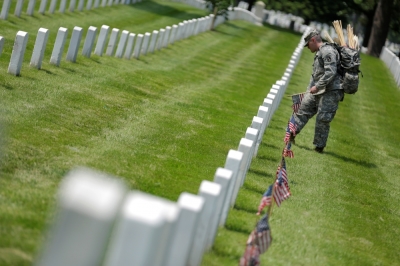This Memorial Day, I'm Thinking of the Soldiers We've Lost at the Hands of Hopelessness

This Memorial Day, as America comes together to remember the men and women who paid the ultimate price for our freedom, I'm thinking of those whom we've lost not at the hands of combat but of hopelessness.
It grieves me knowing by the end of today approximately 20 U.S. veterans will have committed suicide across the nation. And it shocks me that more U.S. troops on the front lines have killed themselves than died in combat in the war with ISIS.
Think about that for a second: An American soldier deployed overseas to fight for his or her country has a higher chance of dying by his or her own hand than being killed by an Islamic State militant, an accident or illness.
If you're surprised to hear these statistics, you'll be heartbroken to know military suicide is not a new trend. The suicide rate of active-duty soldiers has actually remained at record highs for seven consecutive years — and it will likely continue to do so. This is a serious problem, which the U.S. military is trying to solve. Recently, the army conducted a $50 million study to produce algorithms that can identify service members at risk of suicide. I hope that with this new technology, pastors, counselors, and therapists will be able to prevent more men and women from taking their lives.
Though the exact causes of suicide are diverse and often hard to narrow down — they can range from mental illness, stress induced from transitions, PTSD and sudden bouts of depression — I believe that hopelessness is often at the root of what drives people to take their own lives. There's nothing more powerful than how we perceive our purpose and value in life. Yet when people fail to find the purpose and value they were made for, when they become convinced that there is nothing more for them than the life they see at that moment, hopelessness can take over. And when someone loses hope that their life has meaning, it becomes easier to consider suicide as a way out.
One of the most startling facts I found when researching suicide in the U.S. military is that most suicide attempts happen before soldiers are even deployed to combat zones. We are often so focused on the trauma our soldiers will experience during combat that we sometimes neglect the war that's already raging within their hearts and minds. We've also committed the grave mistake of thinking that just offering jobs and benefits to our veterans will lift them out of the emptiness that kills thousands every year. In 2014 — the last year on record — a staggering 7,400 veterans committed suicide.
The reality of military suicide begs us to reconsider how we approach caring for our soldiers and our veterans. Our soldiers need to believe not only that their service is heroic, and someone truly cares for them, but also that their lives truly matter — that they were "made for amazing." Without question, we should thank them for the sacrifices they've made for our great nation, but we also need to recognize them as humans with an innate need for purpose and meaning. It's more than the job of the government to help our veterans and service members thrive in the service and out, our churches, schools, and families must also be there to support those who fight for the freedom we enjoy.
One of my passions is to help people find the life that makes their hearts and souls come alive — to help them discover their leadership and life purpose. Because of this, my team and I launched the Made for Amazing Project. And we set for ourselves the audacious goal of reaching 10 million people with this message: your life matters, you are designed for a purpose, and you are made for amazing.
This Memorial Day, I want to share both my gratitude and that message with the men and women in our military. They all deserve to be recognized for their incredible service, to know they are made for amazing, and to find that amazing life.




















